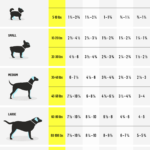Can Dogs Have Breakfast Sausage
Can Dogs Have Breakfast Sausage? Exploring the Pros and Cons of Feeding Your Furry Friend this Popular Morning Meal
If you love breakfast sausage, your dog may also be tempted by its savory smell and taste. However, before you share your morning meal with your furry friend, you need to know whether it is safe and healthy for them to eat it. In this article, we will answer the question “can dogs have breakfast sausage?” by looking at both the benefits and risks of feeding your dog this popular processed meat.
What is Breakfast Sausage?
Breakfast sausage is a type of sausage that is typically served in the morning as part of a traditional American breakfast. It is made from ground pork or beef, mixed with various seasonings such as salt, pepper, sage, thyme, and nutmeg. Some breakfast sausages also contain other ingredients like sugar, corn syrup, soy protein concentrate, preservatives, and artificial flavors.
Why Do Dogs Like Breakfast Sausage?
Dogs are known for their keen sense of smell and taste. They can detect even subtle scents and flavors that humans cannot perceive. Therefore, when they smell the aroma of breakfast sausage cooking in the kitchen or on a grill, they may become excited and eager to try it. Moreover, dogs are omnivores who enjoy a variety of foods, including meat-based products like sausages.
Is Breakfast Sausage Good or Bad for Dogs?
The answer to whether breakfast sausage is good or bad for dogs depends on several factors, such as the quality and quantity of the sausage, the individual health status and dietary needs of your dog, and the frequency of feeding them sausage. Here are some pros and cons to consider:
Pros:
– Protein: Breakfast sausage contains protein which is essential for dogs to build and repair tissues.
– Flavor: Some dogs find breakfast sausage very appealing and may eat more of their regular food if it is mixed with a small amount of sausage.
– Treat: Breakfast sausage can be used as an occasional treat or reward for your dog’s good behavior or training.
Cons:
– Fat: Breakfast sausage is high in fat which can lead to obesity, pancreatitis, and other health problems in dogs who consume it regularly or in large amounts.
– Salt: Breakfast sausage is also high in salt which can cause dehydration, kidney damage, and other health issues in dogs who are sensitive to sodium or already have a pre-existing condition like hypertension.
– Additives: Breakfast sausage often contains additives like preservatives, artificial flavors, and fillers that may not be safe or nutritious for dogs to eat.
How Much Sausage Can Dogs Eat?
The amount of breakfast sausage that dogs can eat depends on their body weight, age, activity level, and overall health. As a general rule, you should avoid giving your dog more than 10% of their daily caloric intake from treats or table scraps. For example, if your dog needs 500 calories per day to maintain their weight and health, you should limit their sausage intake to no more than 50 calories per day. Also, try to choose leaner sausages with lower fat and salt content whenever possible.
What Are Some Alternatives to Breakfast Sausage for Dogs?
If you want to offer your dog a tasty and healthy breakfast alternative to sausage, here are some ideas:
– Cooked eggs: Eggs are a great source of protein and easy to prepare in different ways such as scrambled, boiled, or poached. Just make sure not to add any seasonings like onion or garlic that may be toxic to dogs.
– Fresh fruits: Many dogs enjoy eating fresh fruits like apples, bananas, strawberries, blueberries, and watermelon. Fruits provide vitamins, fiber, and hydration for your dog’s diet.
– Yogurt: Plain, unsweetened yogurt is a good source of calcium and probiotics that can benefit your dog’s digestive health. Just avoid giving them flavored or sweetened yogurts that contain added sugar or artificial ingredients.
Conclusion
In conclusion, dogs can have breakfast sausage but it is not recommended as a regular part of their diet due to its high fat, salt, and additive content. If you want to share your breakfast with your furry friend, choose leaner sausages in moderation and balance them with other nutritious foods. Always consult your veterinarian if you have any concerns about your dog’s diet or health. And remember, a healthy and happy dog is not just what they eat but also how they live, play, and love with you.



